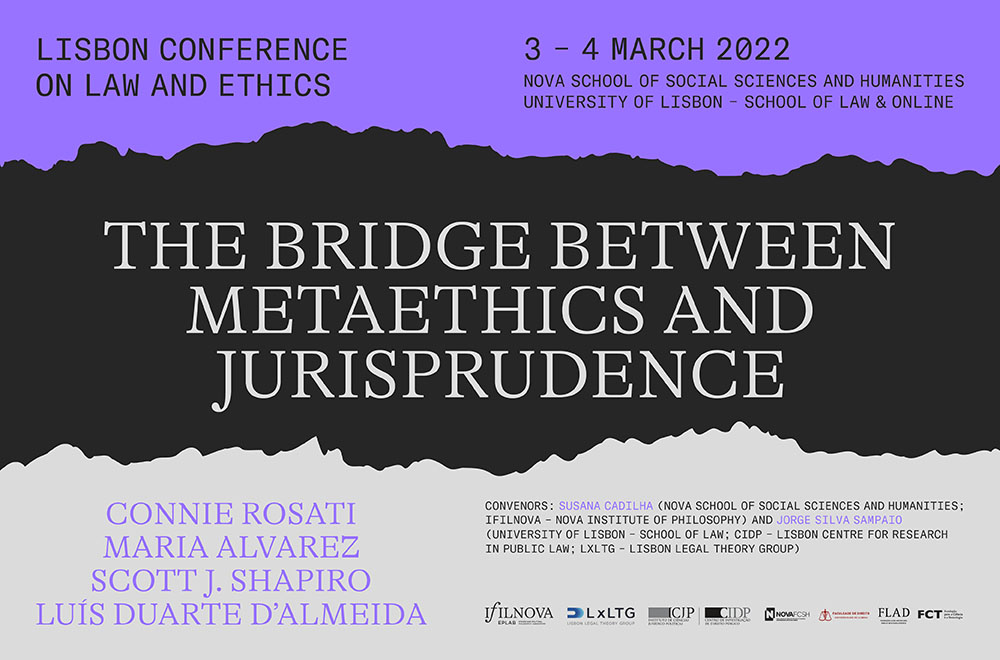The Bridge Between Metaethics and Jurisprudence

Ethics and law are related disciplines, both dealing with the practical question of determining what to do. Nevertheless, the scope, meaning and implications of this relationship is still the subject of considerable disagreement, and is rarely studied jointly by philosophers and legal theorists. And the questions are countless. What is the angle of analysis that best explains this relation? And how deep is the connection? Is there a dominance of moral reasons over legal reasons, as some argue? Or does the institutional character of law justify its autonomy? Instead, can the authority of law actually govern morality?
Both disciplines deal with deontological concepts such as norm, obligation, right, duty, principle, excuse, responsibility, blame. Both are concerned with the normative evaluation of our practical conduct, and the principles that govern it. Both aim at justified normative judgements and discuss the possible foundations of normativity; both dwell around the notion of value and apply to their specific domains of inquiry the notions of reason and reasoning. Meta-ethics in particular is concerned with foundational questions about ethics, such as what is the status and function of normative judgements? Are there any moral facts? What is the relationship between facts and values? What is the relationship between general, thin ethical concepts—good, bad, right, and wrong—and specific, or thick, concepts—courageous, cowardly, kind, cruel, or just? The fact that we have at our disposal different ethical proposals (various ethical principles that should or could guide action, for instance) seems to demonstrate how meta-ethical considerations are necessary and unavoidable to the domain of ethics.
We strongly believe this meta-ethical step back can be decisive in the legal domain, and the relevance of metaethics for jurisprudence has started to become more apparent in recent years. In addition to the common object of inquiry, if there are no moral facts, natural-law theories would necessarily be untenable. In jurisprudence, one of the most interesting discussion in the past decades focus the necessity or contingency of separability between law and morals, which opposes inclusivists, incorporationists and exclusivists within legal positivists. And the questions raised are not immune to metaethics. For example, to which extent can morality influence the identification of valid law in each legal system and judicial adjudication?
Disregarding now the other metaphysical, semantic and epistemological issues, the foregoing clearly reveals the existence of a philosophical common ground that somehow links metaethics to jurisprudence. As some have recently suggested, maybe there is even a 3rd order frame of meta-analysis unifying normative domains, which focus on questions common to both ethics and law; namely, the discussions about normativity and reasons for action, about the linguistic and psychological dimensions of normative statements, about thin and thick evaluative concepts, about the ontology of moral and legal norms and the metaphysics of moral and legal facts, among others. Curiously, if metaethics has invariably served as a fulcrum for the theoretical understanding of law, jurisprudence has rarely been considered as an aid to understanding the moral domain.
This conference aims precisely to address the relationship between metaethics and jurisprudence, the possibility of a more abstract level of scientific analysis that can accommodate both, and, more specifically, to what extent the understanding of ethics and of law can be mutually supportive. We think the research in both areas of study will truly benefit of a joint effort to draw on one another’s resources and to analyse conceptual connections between them. For this purpose, we aim to bring together scholars and graduate students working on ethical and/or legal domains with an interest in possible interactions between both disciplines, or in questions lying at their intersection.
Plan of the workshop
The Workshop will include two moments:
(i) A plenary session with speeches by four guest speakers; and
(ii) A session with the presentation and discussion of the papers submitted in the call for papers.
To join the online sessions, please send an e-mail to one of the convenors, Susana Cadilha [susanacadilha@fcsh.unl.pt] or Jorge Silva Sampaio [jsilvasampaio@gmail.com], asking for access data. If you wish to participate in person, you must also send an e-mail expressing your interest.
MARIA ALVAREZ
SCOTT J. SHAPIRO
LUÍS DUARTE D’ALMEIDA
Jorge Silva Sampaio (University of Lisbon – School of Law; CIDP – Lisbon Centre for Research in Public Law; LxLTG – Lisbon Legal Theory Group)

